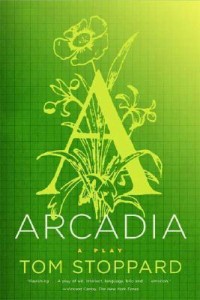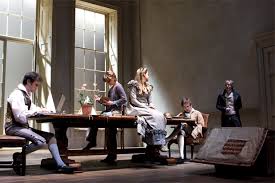 First Performed April 13, 1993, Lyttelton Theatre
First Performed April 13, 1993, Lyttelton Theatre
If ever I were to meet Tom Stoppard I would run to him and hug him. Then, the warmth of the embrace still palpable in my bosom, I would punch him in the face. Then I would hug him again. He is the evil wizard of playwrights and he makes life worth living but for those who have to write essays on his work he also makes you wish you were dead.
‘Arcadia’ is a play that was first performed in the 1990s. It is about Science, Mathematics, Landscape Gardening and the tension between sex and intellect. If you don’t understand iterated algorithms, Chaos Theory or are not intimately acquainted with the laws of thermodynamics or Euclidean Geometry you will be after reading this play.
I use the word ‘reading’ as it is unlikely that you will be able to see this play performed. It has not been staged locally for some time and given its complexity is often said to be isolating to an audience. Regardless, ‘Arcadia’ is a trophy on my shelf. I get it. I understand its deeper meanings and I think I understand all of the allusions (and oh my word there are many), and after countless hours of Googling I think I understand the Science and Mathematics too. I love this play. I possibly love it more than Rosencrantz and Guildenstern are Dead, and that is quite a claim. I love it for its inaccessibility, by which I mean I love the way it makes me feel slightly elite because I know what the Latin means, I know what the calculus signifies and I can correctly explain the philosophical significance of entropy.
‘Arcadia’ is set in a stately home in Berkshire, England. The story takes place across two time periods, 1809 and the modern day, but eventually entangles the players from both settings so that the audience is unclear as to whether they are interacting or not (they are not – the ambiguity serves to communicate the idea of the replication of history).
In 1809 the story centres around child genius Thomasina Coverly and her tutor Septimus Hodge. The pair wrestles with Latin and Thomasina’s anachronistic discoveries. Meanwhile, Lady Croom, Thomasina’s mother, despairs at the devolution of her classical garden into a more Romantic idyll that she views as a haunt for hobgoblins. As with any English stately home there is sexual intrigue as Septimus beds a guest’s wife, LadyCroom beds Lord Byron and duels are scheduled to avenge the honour of the wronged parties.
The modern daysetting sees a pompous English Don and Byron expert, Bernard Nightingale, researching the duels with the theory that Byron shot a poet and this is why he fled English. His research brings him to Sidley Park to find artefacts that could confirm his theory in the old library, and thus bring him fame and glory. He clashes with brusque researcher, Hannah Jarvis, who is driven by rationality and the search for truth where as Bernard is driven by ego and his gut instinct. The pair work with the descendants of the Coverly’s, Valentine and Chloë, to try to unravel the mystery if the home’s past, the seemingly brilliant theories of Thomasina and who on Earth killed the poet Ezra Chatter.
The dialogue, as you would expect of Stoppard, is fast, witty, magical and assumes you have an encyclopaedic knowledge of a myriad of obscure topics. Each exchange is rife with double meaning and often additional suggestions that you will only uncover on a sixth or seventh reading (I’m on my eleventh and am still finding gems). So much is left in the gaps for the audience to work out and in this way the reader has to do what Bernard and Hannah are trying to do on stage. As always Stoppard finds a novel way to break the fourth wall and place the audience in the action and experience the pre-occupations of the play first hand. As suggested the allusions and imagery will likely see you find corners of Wikipedia you didn’t know existed and I would suggest using the ‘Simple English’ translation function for some of the more lofty scientific and mathematical references. You will have to travel through art history, philosophy and the nature of 19th Century landscape architecture to fully appreciate this play but it will be an endeavour that rewards with both hands.
There is a wonderful audio production of the play by LA Theatre works available on iTunes for a small fee which is well worth a listen. The performance is very good and unabridged with only minor alterations to account for the lack of visuals. I would however suggest pausing to note the lengthy stage directions at the beginning of scenes to help you get a sense of the space and some important props.
Don’t be scared. Your mind will thank you.


Pingback: Arcadia – A Review | Mr Young's Blog